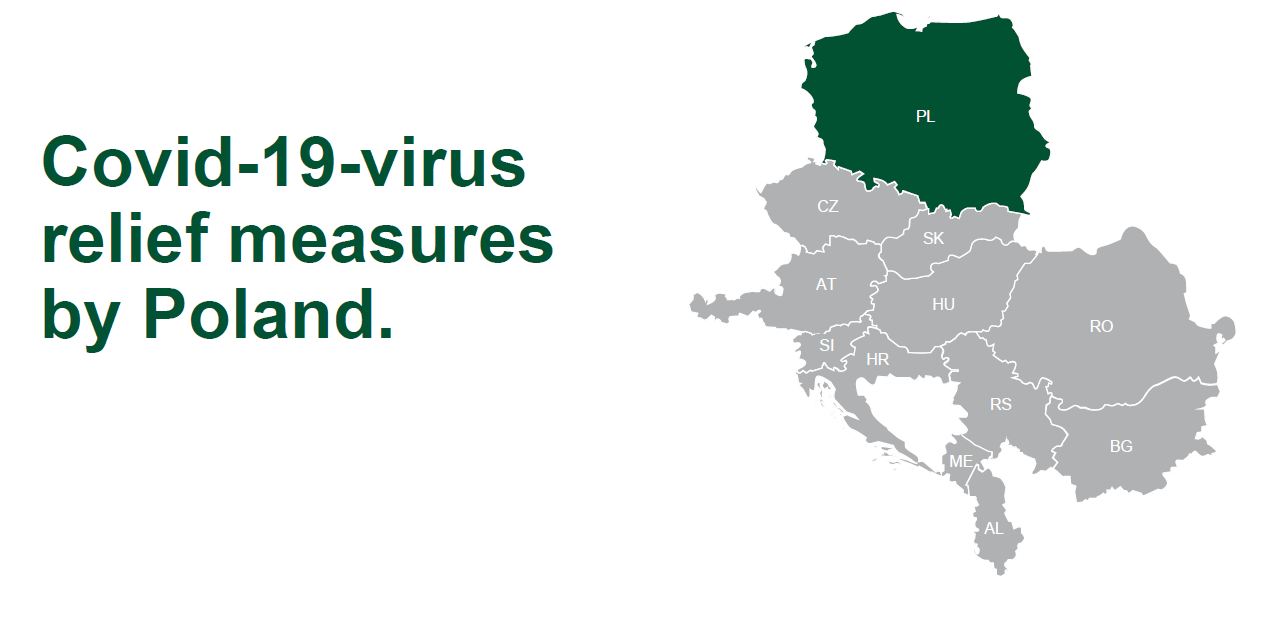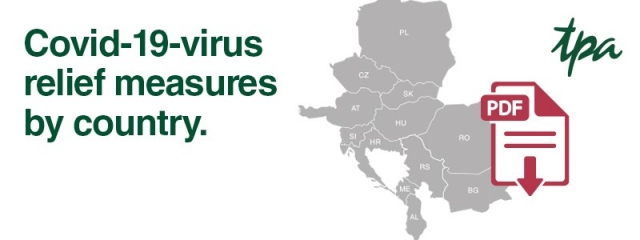
(Update: 9. April 2020)
On March 31, 2020 the Polish Parliament finished the legislative work on the introduction of the regulations regarding measures to combat the negative effects of the coronavirus pandemic. The main objective of the so-called “Anti-crisis shield”, which came into force on April 1, 2020, is to support the polish economy by maintaining business liquidity and protecting employment.
The Polish government declared that the value of the aid program amounts to PLN 212 billion (appox. EUR 47 billion), i.e. almost 10% of the Polish GDP.
The Anti-Crisis Shield in Poland provides among others the following measures:
Exemption of micro-enterprises from social security contributions for 3 months
Micro-enterprises employing up to 9 people will be exempt from social security contributions (ZUS) for 3 months (March-May). The exemption applies to contributions for the entrepreneur and the persons working for him. Self-employed persons with income up to three times the average salary in the Polish economy who pay social security contributions only for themselves can also benefit from the exemption.
Wage subsidies
If certain criteria are met (mainly decrease in turnover of the employer), the state budget will cover 40% of employees’ salaries up to the average salary in the economy. The second 40% has to be covered by the employer and the employee has to agree to have their salary reduced by one fifth. Additionally, the state will subsidize the costs of salaries of company’s employees in downtime, covering half of the amount of the minimum salary in the economy.
Payment for demurrage to contractors and self-employed
Social Security Office (ZUS) will pay demurrage allowance in connection with downtime caused by the coronavirus epidemic. The benefit will amount to, in principle, 80% of the minimum wage in the Polish economy (approx. 2,000 PLN) and will be tax and social security contributions exempt. In will be paid to contractors (personal service contract, mandate, agency contract, for a specific task) and self-employed with income below 3 times the average salary in Polish economy.
Abolition of the extension fee
The extension fee which is charged when granting tax reliefs and deferrals of taxes and social security contributions (such as: deferrals of payment date, payment in instalments or redemption under the provisions of the Tax Ordinance) will be temporarily abolished. The formal condition is to submit a relevant application to the applicable tax authorities and Social Security Office (ZUS). The Minister of Finance may also, by means of an ordinance, waive, in whole or in part, the collection of interest on tax arrears, specifying the type of tax, the territorial scope of the waiver and the period in which the waiver shall occur.
Extension of the deadline for submitting annual CIT return and payment of CIT for 2019
The deadline for submitting annual CIT return and paying corporate income tax (CIT) for 2019 for all taxpayers (whose tax year started after 31 December 2018 and ended before 1 April 2020) is postponed from March 31 to May 31, 2020. In the case of NGOs, the declaration can be submitted until July 31, 2020.
Deduction of donations to counteract COVID-19 from taxable income
Entrepreneurs will be entitled to include donations made for combating COVID-19 in their tax returns. It will be possible to deduct the donations (in cash or in kind) made to entities performing health care activities, including sanitary transport, as well as those made to the Material Reserves Agency and the Central Sanitary and Anti-Epidemic Reserves Base. If these donations are made by entrepreneurs before April 30, 2020, an amount corresponding to 200% is deducted, in May 2020, an amount equal to 150% is deducted and from June 1, 2020 to September 30, 2020, an amount equal to the value of the donation will be deducted.
Possibility of retroactive settlement of tax losses (CIT/PIT)
Taxpayers will be able to deduct the tax loss incurred in 2020 from the income obtained in 2019. For this purpose taxpayers will have to submit a correction of tax return for 2019. This solution is provided for entities whose revenues achieved in 2020 will fall by at least 50% in in relation to the revenues achieved in 2019. A deduction of up to PLN 5 million will be deducted from the income from 2019 (the surplus will be deducted in subsequent years).
No fines for delays in public tenders
Introduction of a mechanism to extend the deadlines for public procurement. This will be done by the procedure releasing from charging contractual penalties for – related to the epidemic – delays in the execution of tenders. At the same time, failure to calculate contractual penalties in this procedure will not constitute a violation of public finance discipline. Additionally, an accelerated procedure or non-application of the provisions of the Public Procurement Law will be introduced in the case of contracts necessary to fight coronavirus.
Facilitation for the tourism industry
Extending the deadline for reimbursement of customer payments in the event of inability to organize an event due to an epidemic (regarding the organization of exhibitions and congresses or cultural, entertainment, recreational, sporting activities, organizing thematic exhibitions or outdoor events) to 180 days from the termination of the contract. Opportunity for customers to use vouchers for the implementation of a tourist event within a year of the day on which the event was to be cancelled due to COVID-19.
Extension of working capital loans
Enabling the calculation of creditworthiness based on financial data as at the end of 2019. This will be accompanied by recommendations on how to calculate loan reserves. The banking sector declared its readiness to extend working capital loans when the regulations were changed. This solution makes it possible to extend working capital loans – amounting to approx. PLN 150 billion – for the enterprise sector.
Extension of legal stay and work permits for foreigners
Extension of residence visas and temporary residence permits for foreigners. Extension of the deadline for submission of applications for residence permits, extension of visa and extension of stay under visa-free travel, if it falls out during the period of epidemic emergency. Extending by law the periods of validity of temporary residence permits and national visas (up to 30 days from the date of cancellation of this state).
Real estate tax exemptions
Local authorities will be authorised to introduce exemptions from real estate tax for a part of 2020 for entrepreneurs whose liquidity has been negatively impacted by COVID-19. Furthermore, mayors or presidents of cities will be authorised to extend the deadlines for payment of real estate tax instalments, payable in April, May and June 2020.
Extension of the deadline for tax-remitters to pay advance payments on payroll taxes collected in March and April
In the case of advances for personal income tax for March and April 2020 on remuneration paid by employers, the payment deadline is prolonged to June 1, 2020 if tax-remitters (employers) have suffered negative economic consequences due to COVID-19. These regulations apply also to payments under personal service contracts and specific work contracts.
Extension of the deadline for perpetual usufruct fee
The payment deadline for perpetual usufruct is postponed until June 30, 2020.
Possibility to opt out of simplified advances in 2020
“Small taxpayers” will be able to opt out of simplified advances. Taxpayers who opt out of the simplified advances for the period March-December 2020 will calculate monthly advances on current income.
Postponement of the date of entry into force of the new SAF-T VAT and CRRB applications
The provisions postpone until July 1, 2020 the obligation to submit a new SAF-T VAT for “large enterprises”. In addition, until July 13, 2020, the deadline for submitting applications to the Central Register of Real Beneficiaries (CRRB) has been extended.
Payments outside the White List
From 3 to 14 days, will be extended the deadline for notifying the tax authorities of payments to an account outside the white list (payments for transactions worth over PLN 15,000). The 14-day deadline will apply only during the period of epidemic emergency status or epidemic status announced due to COVID-19.
Other planned solutions
- Postponing the entry into force of the VAT matrix from April 1 to July 1, 2020.
- Postponing the obligation to create Employee Capital Plans in medium-sized enterprises to October 1, 2020.
- Extension of the deadline for submitting information on transactions with related parties (transfer pricing) to 30 September 2020.
- Postponing the entry into force of legal solutions regarding the equalization of the legal position of small entrepreneurs and consumers from 1 June 2020 to 1 January 2021;
- Deferral of retail sales tax until January 1, 2021.
- Possibility to suspend tax audits and tax proceedings for the duration of the epidemic.
- Extension of the deadline for filing annual CIT return for non-governmental organizations.
- Exemption from transaction tax (PCC) on loans concluded until August 31, 2020 if the borrower
is the entrepreneur whose financial liquidity has deteriorated due to negative economic consequences due to COVID-19. - Possibility to suspend administrative enforcement proceedings against cash receivables.
- Support for transport companies in refinancing lease contracts.
- Enabling stores – on Sundays subject to a trade ban – to accept goods, unload them and put them on shelves.
- The possibility of postponing the deadline for testing technical devices, while maintaining the possibility of operation for a maximum period of another 6 months.
Deferral of deadline for conclusion of mandatory occupational pension schemes contracts (PPK)
Moreover to the above mentioned measures, the COVID-19 Law amends the Law on Occupational Pension Schemes in relation to the application of mandatory occupational pension schemes (PPK).
For companies employing at least 50 employees, the deadline to conclude such PPK contracts with a financial institution is deferred by the COVID-19 Law from 10 April to 10 November 2020.
Background of PPK contracts:
- PPK contracts were introduced in 2019 by Polish government as a new mandatory vehicle of systematic savings for employees’ pensions.
- Basic mandatory contribution amounts to 2% of gross salary. The employee is entitled to increase his contribution by another 2%.
- Employer’s mandatory contribution amounts to 1.5% of the employee’s gross salary. An additional 2.5% of the employee’s gross salary may be contributed.
- The maximum amount of PPK contributions cannot exceed PLN equivalent of USD 50,000 per year as calculated based on the average exchange rate announced by the National Bank of Poland on the last business day of the preceding year.
- The employer’s contributions to the PPKs will be treated as taxable income at the employee.
Stay healthy!
Interactive PDF with all COVID-19 measures by country:
The governments of different countries have decided on immediate actions to moderate the impact of the Covid-19 pandemic on their national economy. Our local experts from CEE/SEE present the details of the COVID-19 virus relief measures by 12 countries.

